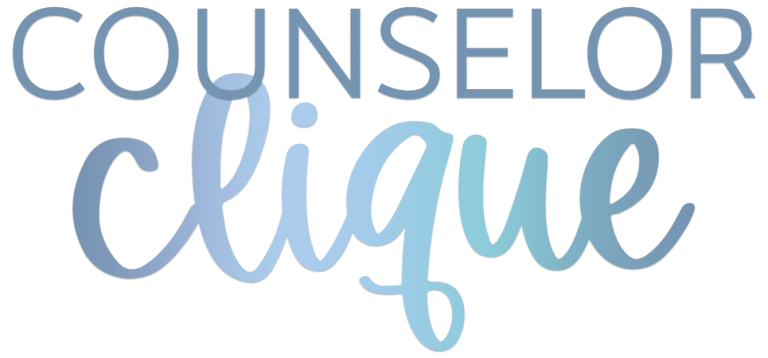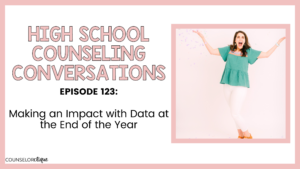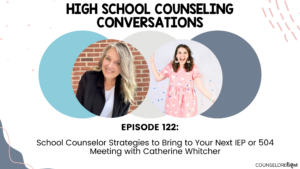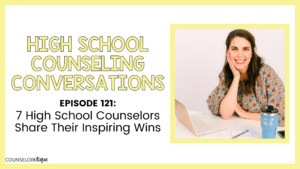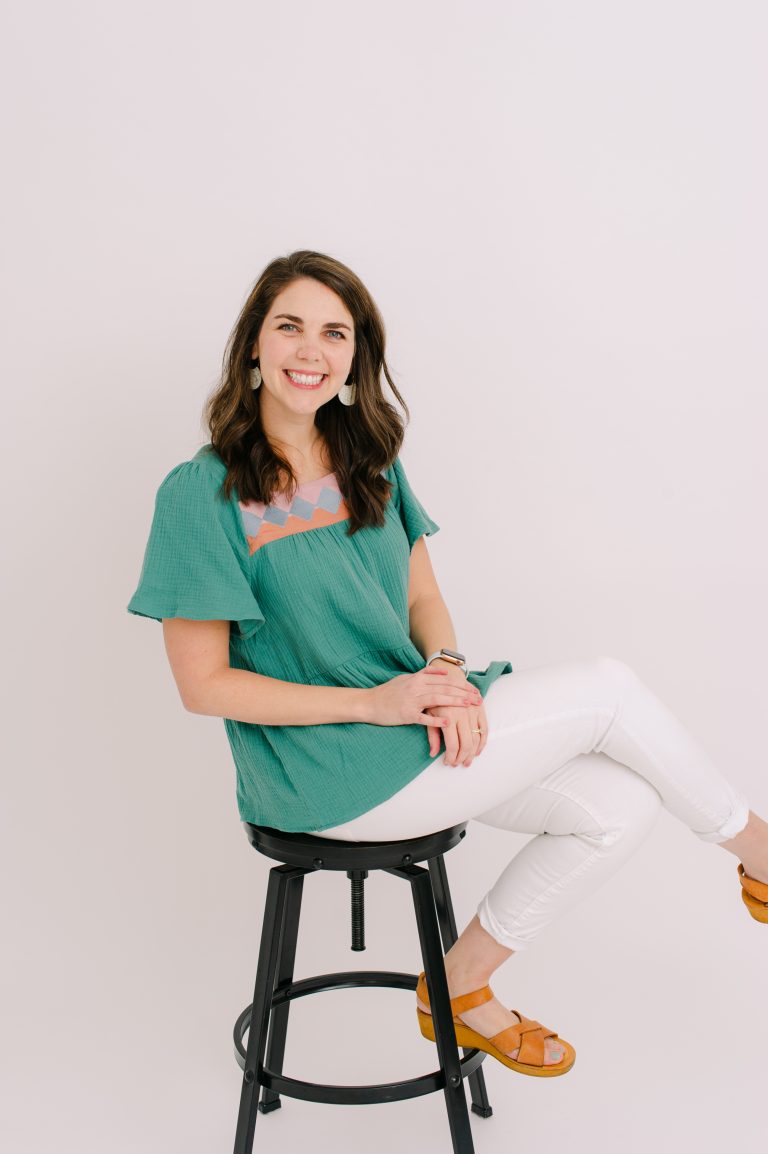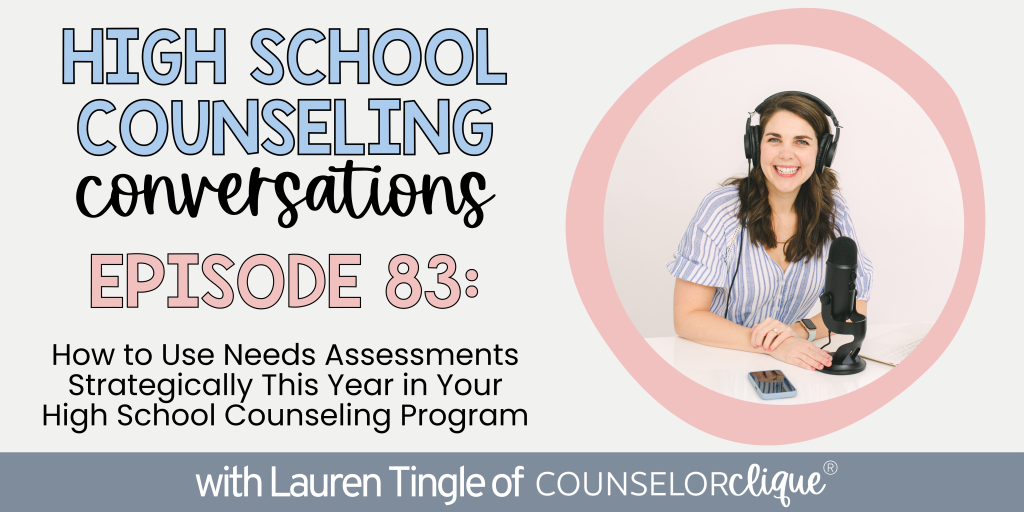
Here's What to Expect In This Episode:
Topics Covered in This Episode:
- Why should start your year with needs assessments
- A reminder that all needs assessments are individual to the school and student body that you’re giving it to
- My suggestions for what to include in your needs assessments
- How your needs assessments can inform decisions surrounding programs, small groups, Smart Goals, and more
- The three main realms that we serve students in, and how our needs assessments can give you more information about them
- A warning to be prepared for all kinds of feedback
- What to do after getting the results from your needs assessments
Resources Mentioned in This Episode:
- Get on the waitlist for The Clique Collaborative
- Visit my High School Counselor Amazon Storefront
- Research Article: “Initial Validation of the ASCA-Informed Student Needs Assessment – High School Version” by Rawn A. Boulden
- Podcast: Episode 42, How to Use Data in Your High School Counseling Program Without Overthinking It
- Podcast: Episode 82, Set Your Year Up for Success With a Summer Team Planning Day
- Leave your review for School Counseling Conversations on Apple Podcasts
Other Blog Posts You Might Like:
Read the transcript for this episode:
0:00
This month inside of my High School Counseling Membership, The Clique Collaborative, we are doing a deep dive on needs assessments. I figure we’ll do a more intro level episode on needs assessments here on the podcast today.
0:13
If deeper dives on relevant High School Counseling topics sounds interesting to you get your name on the waitlist for the Clique Collaborative because doors are opening again mid August. Go to www.cliquecollab.com. I’ll link that in the show notes so you don’t forget. But let’s get to talking about needs assessments in today’s episode.
0:39
You got into this profession to make a difference in your students’ lives, but you’re spread thin by all the things that keep getting added to your to do list. I can’t create more hours in the day, but I can invite you into my Counselor Clique where you’ll finally catch your breath. Come with me as we unpack creative ideas and effective strategies that will help you be the counselor who leaves a lifelong impact on your students. I’m Lauren Tingle, your High School Counseling hype-girl. Here to help you energize your school counseling program and remind you of how much you love your job.
1:12
I’m actually surprising myself that I haven’t talked about needs assessments much on my podcast or even in past blog posts. I just double checked both, and I’ve never done an episode or a blog post on needs assessments at all.
1:24
You’ve heard me stressed the importance of data in your school counseling program. From proving yourself to be a school counselor instead of a guidance counselor, more on that back in episode 80. To uust generally using data without overthinking it, go back to Episode 42. Being data driven is one of the best ways to advocate for your role and how your time is spent.
1:46
Starting with a needs assessment or a student survey starts all of this moving in the right direction from the very beginning of the year. You can start thinking about your needs assessment at your Off Campus Planning Day. Remember, last week’s episode 82? Head back and listen if you don’t know what I’m referencing here.
1:50
At your planning day, you’re going to start framing out your SMART goals for the year based on last year’s data. Maybe some school wide goals or other things you’ve observed in your school. I would say making all final decisions about your SMART goals though, until you’ve done a needs assessment with your students to really hear what they need from their perspective.
1:50
A needs assessment at the start of the year is truly going to inform the direction of your program and make it a lot easier for you to plan out your semester or your year. Be strategic and how you put it together. I’ve only ever given a sample student needs assessment out to members inside the Clique Collaborative, because I feel very strongly that every needs assessment is individual to the school and the student body that you’re giving it out to.
2:44
These can even change from year to year. So maybe not using the exact same one copying pasting from last year. Me providing you with the exact formula for how to create yours won’t be super, super helpful. I’d be wary of any needs assessment that you just copied and pasted from the internet without giving much thought to individualizing it for your school.
3:04
If you’re going to put the effort into getting students to fill it out, and let me tell you, it’s sometimes hard to do, make sure it’s asking relevant questions that you want the answers to. Here are some my thoughts for what you can include though and your needs assessment.
3:17
First, think about what you want the answers to and ask those questions. I know that sounds really simple and almost silly. This is your chance to hear some student perspectives. When you examine your data from the end of last school year, what stood out to you?
3:32
Have you noticed anything around the school that seems like a disconnect or just seems off to you? When you look at your attendance, behavior, or academic data, what gaps are noticeable? The answers to these questions and the data behind these gaps are going to inform the types of initiatives, programs, small groups, and smart goals that you pursue this school year.
3:57
Are you looking for resources like supplies, books for PD, fidgets, and more recommendations for your office? Visit my Amazon Storefront which is easily categorized for you to sort through ideas of what you may be looking for in terms of physical items for your space this upcoming school year.
4:12
Visit amazon.com/shop/counselorclique to see what’s in my High School Counselor Storefront. You can also listen to episode 32 of the podcast for back-to-school tips on how to use many of these items in your office. I’ll link to both of these resources in the show notes for you. Now back to today’s episode.
4:34
Second, when you look at your program as it stands now, and you’re working towards making it the most comprehensive high school counseling program possible, where can you still do some work? Do you go into the classrooms for academic lessons, but you’ve never done a classroom lesson on anything social emotional? Let’s think about how we can work a question in there about a topic that students would like to engage with most.
4:54
Have you ever run small groups before? Listing topics that your students will be interested in and having them check off what they care about is a great way to see what needs are in the school for small groups.
4:54
Are already running small groups that your school for social emotional needs, but maybe you’re noticing you have some other tier II gaps for academics or career? Maybe add in an option for small groups on those topics.
5:16
Think about our three main realms that we serve students in; academics, college and career, and social emotional. What types of questions can you incorporate into your needs assessment that meet these three categories and give you some more information about your student body and what they need?
5:31
Third, make the questions as easy as possible to answer. Give options for Likert Scale questions like a one through four rating and give a few open ended questions. Lots of times students, and us too, of course, don’t know what they don’t know.
5:45
If you just ask them straight up, what small group would you like to participate in and left that open ended, you might not get many responses. Especially if they don’t know what a small group is. If they’re intimidated to participate in one. If they don’t know what their options are. So this is a question that I would give options for.
6:02
For every 20 open-ended questions left blank, you’ll get a really good suggestion that could be a game changing idea for your program or your student population. Think about yourself filling out a survey. If things get too complicated, how likely are you to finish it and hit submit? Probably not very likely. Keep it simple.
6:20
Here’s a warning to anytime you elicit feedback, whether it be from students, parents, teachers, take it all with a grain of salt. Prepare yourself to have some thick skin upon reading it. Some people will be so kind and helpful with their responses. And these will build you up and remind you of why you love being a counselor. Some people though, will use this as their opportunity to lay into everything they’ve ever held back from a bad experience they had with one person, one time.
6:47
Every question on your needs assessments should be meaningful to make changes in your program. If you look at a question, and it doesn’t call for an action step for you with the information that you’ll receive from it, think about it, does it really need to be in there?
6:59
You know how big of an ordeal it is to get something like this out to everyone and get them to answer it, so just want you thinking critically about what’s inside your survey. I want this to count and I want it to be meaningful for you.
7:11
When you get your results back, take some time individually as counselors to analyze what you see and come up with some ideas of next steps. Then come together as a team to share your findings. See what really stands out and needs to be addressed based on what your students are telling you.
7:26
I hope this gave you some ideas of what to include in your needs assessment and where you should go at the start of the year to inform the rest of your years of programming for your High School Counseling program. I’ll see you next week.
7:40
Thanks for listening to today’s episode of High School Counseling Conversations. All the links I talked about today can be found in the show notes and also at counselorclique.com/podcast. Be sure to hit follow wherever you listen to your podcast so that you never miss a new episode. Connect with me over on Instagram. Feel free to send me a DM @counselorclique that’s CLIQUE. I’ll see you next week.
.
Connect with Lauren:
Cheers + Happy Listening!
Like what you’re hearing? Follow and leave a review on Apple Podcasts. It helps other high school counseling friends find it!
Can’t contain your excitement? Share the pod! Tell a friend! Your word-of-mouth referrals mean the world to me!

